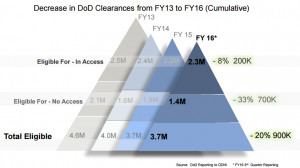In the wake of another insider threat scandal, the Insider Threat and Security Clearance Reform Cross Agency Priority Goals have been updated. And it appears changes to self-reporting procedures are underway.
“The Insider Threat and Security Clearance Reform (ITSCR) Cross Agency Priority (CAP) Goals have been re-baselined so that they are aligned with the new enterprise-wide focus of the PAC Strategic Intent and EIT Strategy, and its four work streams (Trusted Workforce, Modern Vetting, Secure and Modern Mission-Capable IT, and Continuous Performance Improvement) for modernizing the SSC mission over the next five years,” the report states.
One of the updated goals (Trusted Workforce) focuses on ensuring workers are educated on the procedures for reporting potential issues.
“We must equip our workforce with the necessary training and resources to assist the workforce in responsibly reporting and/or self-reporting information of potential concern,” the report says.
The executive branch hopes to establish new reporting requirements. It’s unsure what that requirement might look like, but it’s clear the government would like to ensure harsher penalties for those who may be aware of a security issue and fail to report it.
Social Media Monitoring
Technology is also on the agenda, with the ITSRC making note of Security Executive Agent Directive (SEAD) 5 and the ability of agencies to collect and evaluate social media in national security vetting. The quarterly report calls for notes the approval of new Quality Assessment Standards (QAS) across federal government. “To improve background investigation quality, we must begin by measuring,” the report states.
Modernizing the Investigation Process
The report also sites the need to put an end to the eQIP and replace it with a modern ‘eApplication’ system. The National Background Investigation Bureau (NBIB), launched in October, takes on the mission of modernizing the IT systems powering the background investigation process.
Security Clearance Delays
All of these changes come as the background investigations process remains bogged down in months of delays. The report noted the average processing time for a secret investigation is 147 days; a top secret investigation is 210 days, and reinvestigations are taking an average of 211 days.
Reform efforts continue to emphasize the need to do more to improve the quality of investigations. Whether any of these efforts will improve timelines remains to be seen – but it doesn’t look promising yet.





